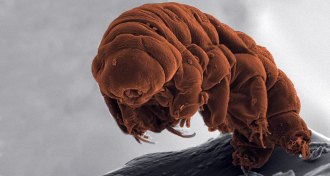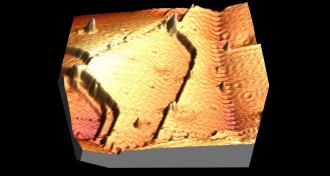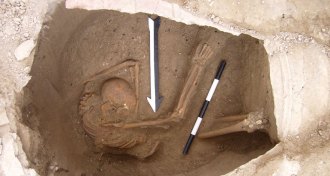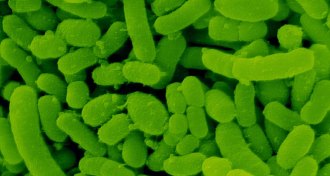News
-
 Space
SpacePotential ingredient for alien life found on Titan
The atmosphere and oceans of Saturn’s moon Titan contain vinyl cyanide, a compound predicted to form cell-like bubbles.
-
 Genetics
GeneticsTardigrades aren’t champion gene swappers after all
Genetic studies reveal more secrets of the bizarre creatures known as tardigrades.
-
 Materials Science
Materials ScienceThe thinnest films of copper look flat, but they aren’t
It turns out that thin films of copper don’t lay flat, a discovery that has implications for computers and handheld electronics.
-
 Anthropology
AnthropologyAncient DNA offers clues to the Canaanites’ fate
DNA is painting a more detailed portrait of the ancient Canaanites, who have largely been studied through the secondhand accounts of their contemporaries.
-
 Astronomy
AstronomyHalf of the Milky Way comes from other galaxies
A galaxy may swipe up to half of its atoms from other galaxies, making the Milky Way mostly extragalactic stuff, new simulations suggest.
-
 Plants
PlantsBorrowed genes give mums the blues
Scientists have genetically modified chrysanthemums to be “true blue” for the first time.
-
 Planetary Science
Planetary ScienceMore hints of Martian hot springs may hold promise for Mars 2020 mission
An analysis of ridges in a crater of Margaritifer Terra on Mars offers evidence of ancient hot springs and also hints at the potential for finding signs of life.
-
 Quantum Physics
Quantum PhysicsQuantum tunneling takes time, new study shows
A new measurement disfavors the idea that electrons can escape atoms instantaneously.
-
 Health & Medicine
Health & MedicineMost football players who donated their brains to science had traumatic injury
A self-selected sample of 202 deceased football players, the largest to date, finds that the majority suffered from chronic traumatic encephalopathy.
-
 Health & Medicine
Health & MedicineAdd penis bacteria to the list of HIV risk factors
Certain bacteria found on the penis raise the risk of HIV infection, a new study finds.
-
 Astronomy
AstronomyFewer big rogue planets roam the galaxy, recount shows
Jupiter-mass planets without parent solar systems are less common than astronomers thought, a new study suggests.
-
 Chemistry
ChemistryRadioactive substances leave electron ‘fingerprints’ behind
A new method of nuclear forensics could make it harder to handle radioactive material in secret.